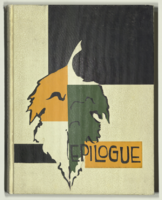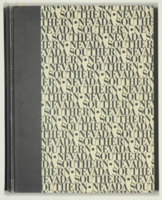Search the Special Collections and Archives Portal
Search Results

Transcript of interview with Evelyn Miller McDonald by Maylene C. Cabatingan, February 26 & 27, 1980
Date
Archival Collection
Description
On February 26, and 27, 1980, Maylene C. Cabatingan interviewed Evelyn Miller McDonald (born 1905 in Alderson, West Virginia) about her life in Las Vegas, Nevada. Also present during the interview is Maylene’s step-father (name unknown) who occasionally participates in the conversation. At the time of the interview, McDonald had lived in Nevada for over seventy-two years and described early Las Vegas as a small-town railroad community with few amenities. McDonald discusses her occupational history, and how her father started the first car garage in Las Vegas. She goes on to talk about the impact of the Great Depression on Las Vegas and how Hoover Dam’s construction reduced the severity of the financial depression in comparison to other cities. She then recites the hotels that were built and the appeal that Vegas had to tourists and divorcees. McDonald later discusses how prostitution was accepted by the community, and recalls a story about how local businessmen rallied together to ensure that a minister would preach the funeral for a young woman who had died, despite being a prostitute. McDonald concludes her interview with a brief discussion of her goals in life and her pride in her daughters.
Text
Transcript of bus tour of "Jewish Las Vegas" by Temple Beth Sholom, May 17, 2015
Date
Archival Collection
Description
Temple Beth Sholom organized and led a bus tour of parts of Las Vegas that are significant in local Jewish history. Stops on the tour included Woodlawn Cemetery and the former Temple Beth Sholom campus on Oakey Boulevard. Narrator Arlene Blut gives the overview of the Jewish community, and Rabbi Felipe Goodman talks to tour participants at the cemetery. Former Las Vegas mayor Oscar Goodman speaks at the old synagogue along with Josh Abbey, whose mother created the stained glass windows at the temple.
Text

Interview with Donna Smith, November 4, 2006
Date
Archival Collection
Description
Text

Transcript of interview with Stella Iaconis by Gary Gione, February 26, 1976
Date
Archival Collection
Description
On February 26, 1976, Gary Gione interviewed Stella Iaconis (born September 16th, 1910 in Italy) about her life in Southern Nevada. The two discuss Iaconis’ reasons for moving to Las Vegas as well as her childhood memories of Hooverville. Iaconis also talks about seeing the above-ground atomic tests in Southern Nevada from Los Angeles, and the drastic population growth that occurred after the construction of Hoover Dam.
Text

Transcript of interview with John L. Houck by Perry L. Smith, March 14, 1981
Date
Archival Collection
Description
On March 14, 1981, collector Perry L. Smith interviewed police officer, John L. Houck, (born May 11th, 1944 in Butte, Montana) in his home in Las Vegas, Nevada. This interview offers an overview of the history of Las Vegas and insider details on early Las Vegas police work. The interview concludes with a discussion on Henderson and Boulder City.
Text

Transcript of interview with Louis Evans by Jeannettte Lonpergan, February 17, 1976
Date
Archival Collection
Description
On February 17, 1976, Jeannette Lonpergan interviewed well driller and dairy worker, Mr. Louis Evans (born on August 8th, 1914 in Jones County, Iowa) in his home in Las Vegas, Nevada. Mrs. Lonpergan’s husband, Mr. Dennis Lonpergan, was present during the interview and joined in on the discussion. Mr. Louis Evans’ wife, Mrs. Evans, was also present during the interview. Mr. Evans relocated to Nevada from Iowa in search of employment. Construction on the Hoover Dam had begun at this point; Mr. and Mrs. Evans recall their earliest recollections of Nellis Air Force Base and McCarran Airport. The interview covers the history of Nevada from Mr. Evans’ perspective. Mr. Evans discusses the paving of roads, employment, religious activities, housing developments, early above ground atomic tests, social and environmental changes and mining in Nevada.
Text

Transcript of interview with Dale Duane Everett by John Everett, March 7, 1980
Date
Archival Collection
Description
On March 7, 1980, John Everett interviewed his father, cab driver Dale Everett (born January 29, 1924 in Danville, Illinois) at their family home in Las Vegas, Nevada. This interview covers past local historical data. During the interview, Mr. Everett discusses the weather, wildlife, and hunting. He also shares his views on prostitution and gambling in Las Vegas.
Text

Transcript of interview with Harriett Thornton Hicks by Claytee D. White, October 28, 2009
Date
Archival Collection
Description
Harriett Thornton Hicks was born June 8, 1913,in Parowan, Utah; the thirteenth child of 14. She tells of her pioneer family who dwelled in two log cabins—one for cooking and one for sleeping. In 1931, she moved to Las Vegas to join two older sisters who had relocated here. She was picked up at the train by young Charles Hicks, who was a friend of her sisters. Charles had a car and offered to provide transportation. Within three years, the two were married. She quit her drug store job to raise a family and he worked for the railroad, the only business at the time in Las Vegas. At the age of 96, Harriett recalls a range of community milestones, such as the Boulder Dam, the news of Pearl Harbor bombing, Fremont Street, the Biltmore Hotel, and how to live in a city with mob influences.
Text

Epilogue: Nevada Southern University Yearbook, 1963
Date
Description
Yearbook main highlights: schools and departments; detailed lists with names and headshots of faculty, administration and students; variety of photos from activities, festivals, campus life, and buildings; campus organizations such as sororities, fraternities and councils; beauty contest winners; college sports and featured athletes; and printed advertisements of local businesses; Institution name: Nevada Southern University, Las Vegas, NV
Mixed Content

Epilogue: Nevada Southern University Yearbook, 1964
Date
Description
Yearbook main highlights: schools and departments; detailed lists with names and headshots of faculty, administration and students; variety of photos from activities, festivals, campus life, and buildings; campus organizations such as sororities, fraternities and councils; beauty contest winners; college sports and featured athletes; and printed advertisements of local businesses; Institution name: Nevada Southern University, Las Vegas, NV
Mixed Content
